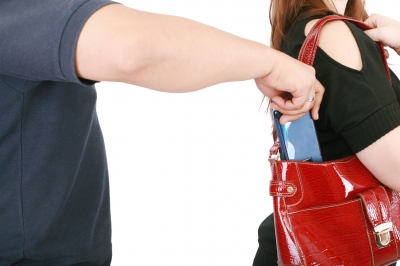Security issue: Pickpocketing
Contents
Security issue: Pickpocketing
Pickpocketing is a form of theft that involves the stealing of valuables from a victim without their noticing the theft at the time.
Description
Attributing circumstances
Some areas are very tempting for pickpockets, so you should be especially careful when you are in the following places:
- Public realm - urban square and parks
- Outdoor activities and shows
- Public markets
- Waiting lines
- Traffic lights
- Escalators
- Rush hour in public transit
- Food courts
- Major public parking lots
The most significant factor in the victim profile possibly may be psychological. A crowded terminal creates a distracting environment. People are packed together in cramped waiting areas listening for public announcements, watching a departure, carrying packages, or talking on a cellular telephone. The station's environment creates a sensory overload. Further, the victims, conditioned by the rush hour atmosphere of the station, are accustomed to the close physical proximity of other people. Those who use mass transit expect to be bumped and jostled. The victim also expects to have even less personal space when descending the escalators and riding the train, focusing more on boarding the train and finding a seat than being concerned with others.[1]
Impacts
- perception of unsafety
Economic impact
Property crimes such as pickpocketing lead to considerable costs in both a direct (primary) and a indirect (secondary) way[2]. Direct costs of pickpocketing come in the form of:
- Preventive costs in anticipation of pickpocketing (e.g. security measures, prevention, insurance fees);
- Material and immaterial costs as a consequence of pickpocketing (e.g. physical damage, repairments, mental harm); and
- Responsive costs to pickpocketing (e.g. the costs of detection and prevention, persecution, support trial, etc.).
In addition, pickpocketing on a large scale can lead to secondary economic impact in terms of, for example, less tourism and a decrease in business for local business owners.
Measures
- Surveillance
- Reaction force
Footnotes and references
- ↑ http://findarticles.com/p/articles/mi_m2194/is_12_72/ai_112799969/
- ↑ Primary economic impact (or direct effects) are generally defined as the initial, immediate economic output generated by a specific cause (in this case a criminal offence). Secondary economic impact (or indirect effects) are generated each time a subsequent transaction is made, for example, the impact of crime on the real estate value in the neighborhood.
MAP
<websiteFrame> website=http://securipedia.eu/cool/index.php?concept=Security issue: Pickpocketing width=100% border=0 scroll=auto align=middle </websiteFrame>
<headertabs/>
